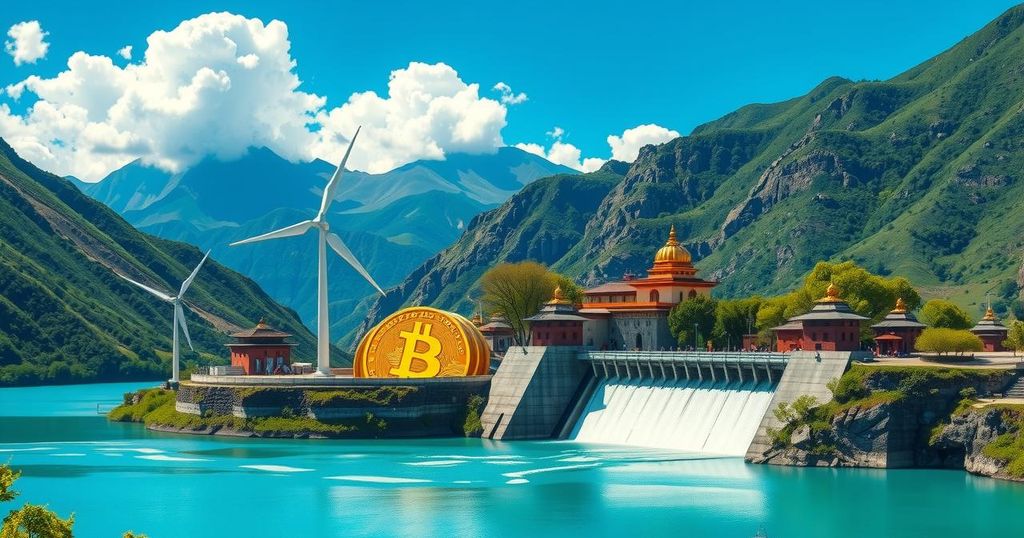Bhutan’s Bold Bet: How Bitcoin is Transforming a Himalayan Kingdom
Bhutan is boldly embracing Bitcoin in a bid to tackle economic challenges and retain talent. With an abundant hydropower resource, the country mines Bitcoin to boost civil servant salaries and strengthen its economy. The decision reflects Bhutan’s innovative approach, aligning financial growth with sustainability goals, as it navigates the complexities of modern finance.
In a surprising twist amid economic difficulties and an exodus of young talent, Bhutan has taken a bold step into the world of cryptocurrencies, particularly Bitcoin. The small Himalayan kingdom, known for its unique focus on happiness as a measure of progress, has more recently focused on financial innovation as a path to stability, doubling civil servant salaries with crypto proceeds. The question arises, why is this oft-overlooked nation betting big on Bitcoin?
Historically, Bhutan has found its economic footing through hydropower. Nestled between giants India and China, the country has harnessed its strong energy resources to mine Bitcoin, effectively positioning itself as a key player on the global crypto scene. However, with the backdrop of economic challenges, many are puzzled by this move. Can Bitcoin truly help alleviate Bhutan’s pressing issues?
So, how exactly is Bhutan mining Bitcoin? The country utilizes its plentiful hydropower to fuel supercomputers that solve intricate problems required to generate new Bitcoins. Prime Minister Tshering Tobgay recently highlighted this strategy, explaining that excess energy during summer months makes mining a practical choice. “That’s where Bitcoin mining makes tremendous sense,” he stated, emphasizing the potential economic boon for the nation.
But let’s talk hurdles. Bhutan is in the thick of a financial crisis, exacerbated by high youth unemployment and a significant brain drain. Around 10% of its skilled workforce left in 2022 alone, many seeking better wages abroad, especially in Australia. With civil servant attrition rates soaring, the government made bold moves involving Bitcoin to retain talent and bolster salaries, which reportedly showed promising results.
Here’s the kicker: Bhutan’s Bitcoin holdings have sky-rocketed, though the exact figures remain undisclosed. According to blockchain intelligence firm Arkham, the value is more than $600 million. That’s around 30% of the nation’s GDP. Bhutan is also dabbling in other cryptocurrencies, although Bitcoin remains king here. The king himself has championed the embrace of technology, underscoring Bhutan’s smart approach to economic growth.
Now, is this all sustainable? As analysts see it, tapping into natural resources for mining aligns with Bhutan’s ethos. They aim to ensure that industrialization doesn’t trample on their commitment to environmental excellence. The country’s chilly climate helps mitigate energy consumption for cooling mining equipment, and prime ministerial concerns about foreign investment align well with this green energy initiative.
But let’s step back for a second—Bhutan isn’t alone in this crypto leap. Countries like El Salvador and the Central African Republic are similarly exploring legal tenders involving Bitcoin. Even the United States has set up a strategic reserve for it. The landscape is changing, and as more governments adapt, Bhutan’s gamble on crypto might just signal the dawn of a new era in global finance.
Bhutan’s unusual foray into the cryptocurrency world with Bitcoin is a multilayered strategy aimed at combating economic woes and retaining talent. With its unique hydropower resources, the nation is carving a niche in financial innovation while trying to stay true to its values of sustainability. As the landscape shifts globally, Bhutan’s investment in Bitcoin could serve as a pivotal case study for other nations wrestling with similar issues.
Original Source: www.aljazeera.com




Post Comment